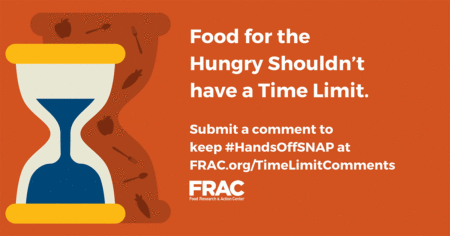FRAC Needs Us to Take Action
The U.S. Department of Agriculture (USDA) plans to impose additional work requirements on unemployed and underemployed people who depend on the Supplemental Nutrition Assistance Program (SNAP) in areas with insufficient jobs.

A proposed rule recently released by the USDA would limit access to SNAP benefits for Able-Bodied Adults Without Dependents (ABAWDs) to 3 months, despite job availability and local unemployment levels. More than 750,000 people will lose their benefits (a loss of 8.5 billion meals over 10 years), increasing food insecurity among this already vulnerable population and putting more pressure on the emergency food system.
Join GBFB in opposing this harmful rule by submitting a public comment on the Food Research and Action Center (FRAC) website by April 2.
What are the current ABAWD work rules for SNAP?
An Able-Bodied Adult Without Dependent (ABAWD) is an individual age 18-50 who has no children living with them and is not disabled. Currently, ABAWDs can only receive SNAP benefits for 3 months unless they meet certain work requirements.
What does the proposed rule change?
Currently, states can waive ABAWD work rules in areas with high unemployment. When economic conditions improve, the waiver expires, and ABAWDs must meet work requirements again.
The proposed rule would essentially eliminate states’ ability to make exemptions for high unemployment areas. Exemptions would only be given to areas with unemployment rates over 10 percent. For comparison, the national unemployment rate peaked at 10 percent during the Great Recession.
What else should you know?
The proposed rule would cut SNAP benefits for 750,000 individuals nationwide. This will put increased pressure on the emergency food system, particularly during periods of economic downturn when need is already high.
The proposed rule would reduce states’ flexibility to respond to economic realities and increase the administrative burden of implementation. This shifts program costs from benefits to feed people to processing paperwork.Similar proposals were introduced in the House Farm Bill but were not included in the final version.
The proposed rule side-steps Congress’ decision. The Farm Bill funds work training pilots—a better way to help ABAWDs achieve economic self-sufficiency.
1. Submit a unique public comment.
- Before the proposed rule can go forward, the Administration is required by law to read and respond to every unique comment received. Advocates are trying to generate as many unique comments as possible – more comments mean more opposition and more political pressure!
- Watch video on how to submit comments here.
- Not sure what to say? Start with this template but remember to make your comment UNIQUE by adding your personal story. Here is a sample comment letter by FRAC.
